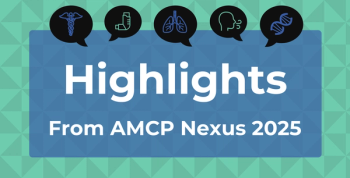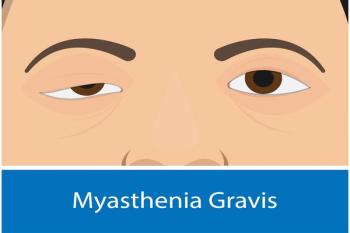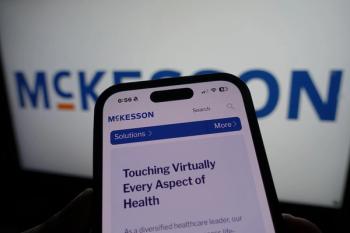
Jonathan Strober, MD, discusses promising results from the VIBRANCE-MG trial, highlighting nipocalimab's safety and efficacy for pediatric myasthenia gravis.

Maggie is a senior editor for The American Journal of Managed Care® (AJMC®) and produces written, video, and podcast content covering several disease states. She joined AJMC® in 2019, and has been with AJMC®’s parent company, MJH Life Sciences®, since 2014, when she started as a copy editor.
She has a BA in English from Penn State University. You can connect with Maggie on LinkedIn.

Jonathan Strober, MD, discusses promising results from the VIBRANCE-MG trial, highlighting nipocalimab's safety and efficacy for pediatric myasthenia gravis.

Patients with generalized myasthenia gravis face significant barriers to diagnosis, creating the need for improved patient–health care interactions.

Explore how patient experience data shapes regulatory drug decisions, enhancing the patient-focused drug development initiative for better treatment outcomes.

Our top RSV content of 2025 included how nirsevimab and clesrovimab changed RSV prevention among younger patients, as well as the positive impact of RSV vaccination in older individuals.

Discover the latest breakthroughs in myasthenia gravis treatment, including rozanolixizumab and nipocalimab, and insights on disease burden and dysphagia indicators.

The San Antonio Breast Cancer Symposium fosters collaboration among experts, enhancing research and treatment strategies for breast cancer's complex landscape.

Paula Rodríguez-Otero, MD, PhD, talks about promising phase 3 trials investigating combination treatments that include lenalidomide or daratumumab

The US Oncology Network comprises over 3200 health care providers and 700 sites of service, with more than 70% of physicians participating in the Enhancing Oncology Model.

Jonathan Strober, MD, discusses advancements in pediatric myasthenia gravis, emphasizing the need for better treatment standards and effective patient care strategies.

Inebilizumab gains FDA approval for treating generalized myasthenia gravis, showing significant improvements in muscle strength and steroid reduction.

Camizestrant significantly improves progression-free survival in advanced breast cancer patients with ESR1 mutations.

Innovative smart pill bottles significantly enhance adherence to oral adjuvant endocrine therapy in early-stage breast cancer, noted Steven Manobianco, MD.

AMCP Nexus 2025 explored innovative health care policies, oncology advancements, and the impact of new regulations on patient access and treatment outcomes.

Research highlights the complex cognitive difficulties faced by breast cancer survivors, emphasizing the need for multifaceted treatment approaches, says Xiaotong Li, PhD, MS.

Research at the San Antonio Breast Cancer Conference highlights T-DXd's superior efficacy and safety in HER2+ metastatic breast cancer, especially among diverse populations.

Discover more about seasonal affective disorder in this interview with Craig Sawchuk, PhD, LP, clinical psychologist at Mayo Clinic.

Innovative deep proteomic profiling reveals promising results from a blood-based test for early breast cancer, showcasing high sensitivity and specificity, explains Justin Drake, PhD.

School reopenings after COVID-19 closures significantly improved children's mental health, reducing diagnoses of depression, anxiety, and ADHD.

New research highlights INCA033989's potential in treating mutCALR-driven essential thrombocythemia and myelofibrosis, achieving significant molecular responses.

Minimally invasive thymectomy for ocular myasthenia gravis (MG) enhanced complete stable remission rates and reduced surgical risks.

Prerna Mewawalla, MD, discusses innovative strategies to enhance cancer care access, reduce clinician burden, and improve clinical trial diversity in real-world settings.

Despite the impact of targeted treatment in oncology, much work remains to bring these therapeutics to all patients, says Bhavana (Tina) Bhatnagar, DO.

Peter Voorhees, MD, explains how daratumumab and hyaluronidase-fihj show superior efficacy in delaying progression of MM compared with active monitoring.

Expert insights help define the complexities of seasonal affective disorder, its unique symptoms, and effective treatment strategies.

McKesson's report highlights key trends in community oncology, emphasizing patient-centered care, precision medicine, and the need for innovative clinical trials.

Experts explore advancements in telehealth and precision medicine, addressing cancer care gaps for rural and underserved populations in oncology.

New research reveals that total social media use does not significantly impact adolescents' body image concerns, challenging previous assumptions.

Sibeprenlimab gains accelerated approval from the FDA for IgA nephropathy, showing significant proteinuria reduction and offering convenient self-injection treatment.

Eleanor Perfetto, PhD, explores how most favored nation policy relates to broader drug pricing and cost-effectiveness debates in the US.

Men's breast cancer awareness is crucial as it often goes unrecognized, leading to advanced stages at diagnosis, Michael Hassett, MD, explains.

259 Prospect Plains Rd, Bldg H
Cranbury, NJ 08512
© 2025 MJH Life Sciences®
All rights reserved.
